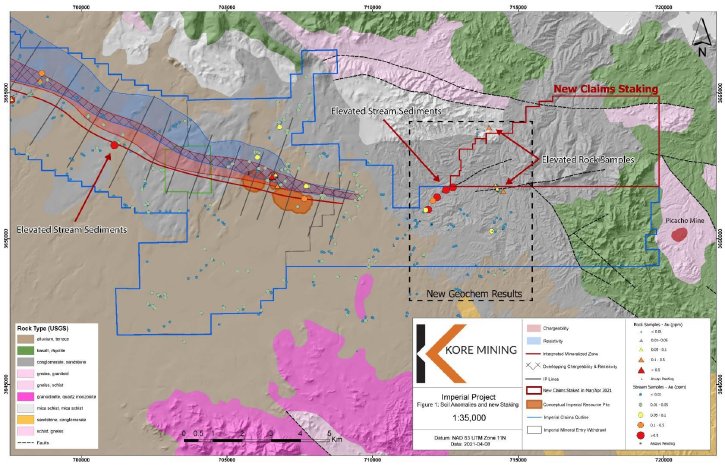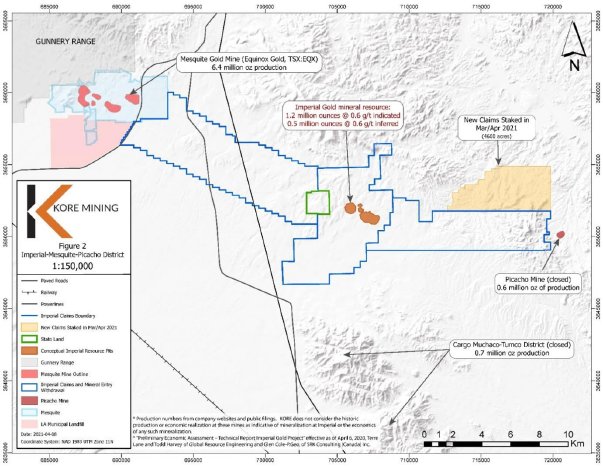Highlights:
- Discovered gold in several dry stream beds between Imperial and Picacho
- Highlights from sampling include 1.0 g/t and 0.6 g/t gold
- Further evidence that the 28-kilometer district from Mesquite-Imperial-Picacho District could host multiple gold discoveries similar in scale to Mesquite and Imperial
- Additional exploration underway including:
- Satellite multispectral survey to identify alteration associated with gold mineralization
- Additional ground geophysics surveys to extend structural interpretation
- Further mapping and geochemical sampling on new targets
KORE’s CEO Scott Trebilcock stated: “With systematic exploration, the immense potential of the Mesquite-Imperial-Picacho District is starting to emerge. KORE controls 100% of the District which was split between major gold companies in the 1990’s. With the Mesquite mine, the last in Imperial County, nearing the end of its life, KORE’s Imperial project and surrounding District may be the last chance to extend the 140-year gold mining history of Imperial County to future generations and provide much needed employment and economic development.”
KORE is committed to operate within the stringent environmental and labour standards of California and plans to concurrently reclaim drill pad locations and ensure measures are taken to mitigate any impacts to biological and cultural resources. KORE has designed the drill programs to maximize the use of existing public road/trail network in the area so as to limit any new disturbances, and the Company will be adjusting our drill pad locations as needed to avoid any sensitive sites should any be encountered.
Figure 1 shows the dry stream bed and rock chip sampling locations. The sampling generated anomalous gold assays in multiple new targets areas. There are government mapped faults associated with several of the anomalies, increasing the prospectively of targets. Figure 2 show the District claim area with location of the Mesquite, Imperial and Picacho deposits along with the newly staked claims.
Future geophysics and other exploration techniques are expected to further define these anomalies. Having the intact Imperial deposit to “tune” or “fingerprint” geophysical signatures, greatly enhances our confidence to target new discoveries under the alluvium along the trend. Details of the work were released January 7, 2020, April 29, 2020 and December 8, 2020.
Sampling and Mapping Program Details
Discovery of gold in the dry stream beds (also called “arroyos” or “washes”) on the target areas are several kilometers from Picacho and Imperial and not downstream from either, indicating that gold is likely being generated from another source. KORE intends to explore and discover those sources.
In the course of collecting the District samples and mapping the area, KORE encountered more outcrop than originally anticipated. This is positive as it indicates the alluvial cover is shallow in those areas, making a new oxide gold discovery easier and more attractive. KORE also found evidence of historic small scale mining activities in the District including hand and bulldozer trenches, an exploration shaft and signs of historic placer mining activity.
KORE’s exploration team collected 497 stream bed and 178 rock chip samples over the last three months of prospecting the District. All assays, except 11 rock chip samples, have now been received and are disclosed. Samples collected averaged 4.75 kilogram in size and were taken at an average depth of 0.4 meters below surface. Of the 497 stream samples, 322 assayed over the gold detection limit of 5 parts per billion and 10 assayed over 100 parts per billion (0.1 g/t). Sample locations and assays for the eastern area from Imperial to Picacho are depicted on Figure 1.
Next Steps
As disclosed March 9 2021, the ongoing exploration program for H1 2021 incudes further detailed soil sampling grids, detailed geological mapping, additional IP geophysics and a satellite multispectral survey of the entire claim area. Drilling on several of the western targets is planned in H2 2021 with permitting underway.
About the Imperial Gold Project
KORE owns 100% of the Mesquite-Imperial-Picacho District which consists of 30,900 acres of claims capturing the entire 28-kilometer trend from the operating Mesquite mine (Equinox Gold - TSX:EQX) to the closed Picacho mine and including KORE’s Imperial project as depicted on Figure 2. In the District, gold is hosted in local fault structures related to a series of regional faults connecting the known District deposits. Those three District deposits (Mesquite-Imperial-Picacho) were discovered in exposed outcrops and from placer workings. The rest of the District is covered by alluvium and has never been systematically explored.
The Mesquite-Imperial-Picacho District centers on KORE’s Imperial project. Imperial is a structurally controlled intermediate sulfidation epithermal gold deposit. The 100% oxide gold deposit is currently defined at 2.44 kilometer long and up to 0.75 kilometer wide and is open both along strike and downdip. It is hosted in a shallowly southwest dipping, amphibolite grade metamorphic rock suite along a west-northwest trending low-angle regional thrust fault system which controls the regional geometry of mineralization. East-west striking, post-mineralization normal faults control the property scale geometry of mineralization. Geophysical characterization of the deposit and regional controlling structures is an essential component of exploration for additional resources.
Imperial has a mineral resource estimate and a positive preliminary economic assessment effective April 6, 2020 with the following highlights:
- Robust economics: US$ 343 million NPV5% post-tax with 44% IRR at US$ 1,450 per ounce gold
- Low capital intensity project with only US$ 143 million pre-production capital cost
- Average 146,000 ounces gold per year over 8 years for 1.2 million ounces total production
- Technically simple project: shallow open pit, run-of-mine heap leach with existing infrastructure
- Value enhancement through Mesquite-Imperial-Picacho District exploration and resource expansion
About KORE Mining
KORE is 100% owner of a portfolio of advanced gold exploration and development assets in California and British Columbia. KORE is supported by strategic investor Eric Sprott who owns 26%. KORE management and Board are aligned with shareholders, owning an additional 38% of the basic shares outstanding. KORE is actively developing its Imperial Gold project and is aggressively exploring across its portfolio of assets.
Further information on Imperial and KORE can be found on the Company’s website at www.koremining.com or by contacting us as info@koremining.com or by telephone at (888) 407-5450.
On behalf of KORE Mining Ltd
”Scott Trebilcock”
Chief Executive Officer
(888) 407-5450
Investor Relations
Arlen Hansen, KIN Communications
1-888-684-6730
kore@kincommunications.com
In Europe:
Swiss Resource Capital AG
Jochen Staiger
info@resource-capital.ch
www.resource-capital.ch
Technical information with respect to the District and Imperial Gold Project contained in this news release has been reviewed and approved by Marc Leduc, P.Eng, who is KORE's COO and is the qualified person under National Instrument 43-101 responsible for the technical matters of this news release.
Neither the TSX Venture Exchange nor its Regulation Services Provider (as that term is defined in the policies of the TSX Venture Exchange) accepts responsibility for the adequacy or accuracy of this release.
Cautionary Statement Regarding Forward-Looking Information
This news release contains forward-looking statements relating to the future operations of the Company and other statements that are not historical facts. Forward-looking statements are often identified by terms such as "will", "may", "should", "anticipate", "expects", “intends”, “indicates” and similar expressions. All statements other than statements of historical fact, included in this release, including, without limitation, statements regarding the future plans and objectives of the Company are forward-looking statements. Forward-looking statements in this news release include, but are not limited to, statements with respect to: final results of future exploration work, including further mapping and sampling and the timeline for completion, the results of the PEA, including future Project opportunities, , the projected NPV, , permit timelines, and the ability to obtain the requisite permits, the market and future price of and demand for gold, , and the ongoing ability to work cooperatively with stakeholders, including the all levels of government. Such forward-looking statements, and any assumptions upon which they are based, are made in good faith and reflect our current judgment regarding the direction of our business. Management believes that these assumptions are reasonable. Forward looking information involves known and unknown risks, uncertainties and other factors which may cause the actual results, performance or achievements of the Company to be materially different from any future results, performance or achievements expressed or implied by the forward-looking information.
Additional risks and uncertainties are described in the “Risks” section of the Company’s management discussion and analysis for the year ended December 31, 2019 prepared as of April 27, 2020 available under the Company’s issuer profile on www.sedar.com.
Forward-looking statements contained herein are made as of the date of this news release and the Company disclaims any obligation to update any forward-looking statements, whether as a result of new information, future events or results, except as may be required by applicable securities laws. There can be no assurance that forward-looking information will prove to be accurate, as actual results and future events could differ materially from those anticipated in such statements. Accordingly, readers should not place undue reliance on forward-looking information.
There is no certainty that all or any part of the mineral resource will be converted into mineral reserve. It is uncertain if further exploration will allow improving the classification of the Indicated or Inferred mineral resource. Mineral resources are not mineral reserves and do not have demonstrated economic viability.


